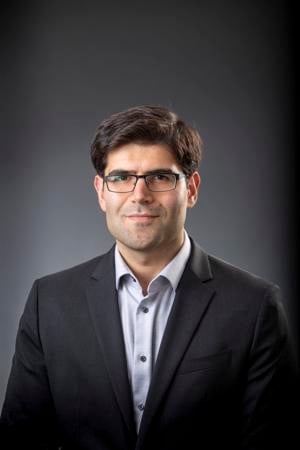Artificial intelligence is nothing new — and actually has origins right here in New Hampshire, with the term coined at Dartmouth College in the 1950s. But despite being nearly 70 years old, AI is certainly having a moment in the last year, with programs like ChatGPT putting this once-futuristic technology into the hands of lay people. But AI’s capabilities go far beyond generating paragraphs of written content in seconds, and copying the voices of popular singers with unnerving accuracy — AI has the power to make health care more streamlined, accessible and equitable.
Dartmouth Health and Dartmouth Cancer Center partnered with Dartmouth College’s Geisel School of Medicine, Thayer School of Engineering and undergraduate arts and sciences program to launch the Dartmouth Center for Precision Health and Artificial Intelligence in the last year. Based at Dartmouth Hitchcock Medical Center, CPHAI uses AI to aggregate patient data for optimal patient care and outcomes. CPHAI’s research and innovations aim to improve public health and advance health care delivery, while upholding the highest ethical standards in the use of AI.

Precision health is a holistic approach that aims to personalize health care by tailoring treatments and disease prevention strategies to a person’s unique biology — their genes, medical history, lifestyle and environment. CPHAI aims to train future leaders in AI and precision health, and conduct research leading to advancements in AI-driven precision health. “At CPHAI, we believe in the transformative potential of AI to improve precision health,” said Saeed Hassanpour, PhD, CPHAI’s director and a researcher at Dartmouth Cancer Center.
“However, we recognize that the realization of this potential requires an interdisciplinary approach that combines not only advanced technology but also the deep understanding of diverse health challenges and the ethical considerations inherent in AI’s application.” Hassanpour, a professor of biomedical data science and of epidemiology at Geisel, is an international leader in developing AI to assess risk of cancer and other diseases, improving the accuracy of diagnoses, and predicting the likelihood of patient response to various treatments. His team at CPHAI works on projects such as developing AI-driven diagnostic tools, optimizing treatment strategies, and analyzing biomedical data to inform public health policies.
AI’s seemingly limitless capabilities give many pause about how it may be used unethically. CPHAI is working to ensure the ethical use of AI in health care by implementing a framework for transparency, fairness, accountability, and privacy protection. “What makes CPHAI unique is its interdisciplinary and comprehensive approach to precision health and artificial intelligence, focusing not only on technological advancements but also on ethical and societal implications,” Hassanpour said, adding that CPHAI works with Dartmouth’s Ethics Institute and other partners to identify AI’s limitations and biases, improve transparency and privacy, and ensure equitable outcomes for all.
While still in its infancy, Hassanpour predicts CPHAI will continue Dartmouth’s legacy as a leader in AI research and New Hampshire’s growing healthcare technology industry. To learn more about CPHAI, visit c-phai.org .
.



















